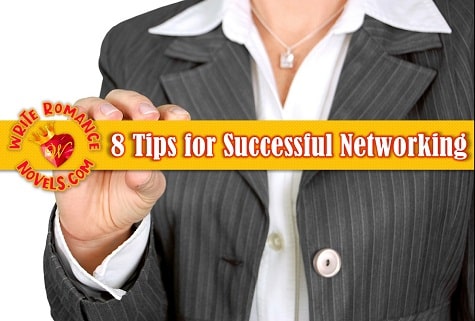Believe it or not, the live writing conference still exists in the world. Successful networking can develop an author’s business allies and grow her readership. In fact, a savvy writer can advance her career by leaps and bounds at a live writing conference — assuming, of course, that she knows how to “work the crowd.”
What Exactly is Networking for Writers?
Networking is word-of-mouth advertising. If you’ve ever asked a friend for a restaurant recommendation, or if you’ve ever urged a relative to visit your favorite salon, then you’ve networked.
 Business networking transpires when two or more writing professionals meet face-to-face to exchange mutually beneficial information. For example, one of the largest writers’ organizations in the United States hosts a live conference every summer in my hometown. For 30 years, the Writers League of Texas has sponsored contests for unpublished authors; face-to-face appointments with New York editors and agents; and a plethora of presentations about craft and business.
Business networking transpires when two or more writing professionals meet face-to-face to exchange mutually beneficial information. For example, one of the largest writers’ organizations in the United States hosts a live conference every summer in my hometown. For 30 years, the Writers League of Texas has sponsored contests for unpublished authors; face-to-face appointments with New York editors and agents; and a plethora of presentations about craft and business.
As a bestselling author and certified life coach, I’ve helped many writers overcome their “jitters” to pitch to an agent, win a book endorsement, arrange a live book signing, or achieve their writing goals.
In this article, I’ll share eight practical tips for successful networking that I’ve used to cultivate business allies at a live writing conference.
Tip #1: Think Like a Business Professional
You are an entrepreneur. At a writing conference, you must treat your experience like a business opportunity. You may have other reasons for attending the event (to enjoy the companionship of friends, for example.) However, if you want to make contacts that will help you build your writing career, you must prioritize.
Network first; play later.
Tip #2: Stick to Your Networking Plan
Before the writing conference starts, you must clarify your goals. If you don’t stick to your networking plan, you may wind up in the corner, discussing the weather with three wallflowers, who won’t advance your career.
Do you want to:
- Meet bestselling authors who might endorse your book?
- Meet bloggers or podcasters who welcome guests?
- Recruit Beta Readers for your new manuscript?
- Introduce your story concept to an agent?
Start hunting for these people.
True Story #1: Networking for Success at a Writing Conference
When I had three award-winning novels to my credit, I was determined to meet a well-respected agent, with whom I’d been corresponding. The problem was, I couldn’t get an appointment with her during a national writing conference.
Undaunted by this setback, I started networking at the event. Every time I crossed paths with a published author, I would ask if she knew my “target agent” and how I might recognize this woman in the crowd.
Eventually, I ran into this agent – physically! – in a doorway. Through the grapevine, she’d heard that I was looking for her, and she invited me for a drink. During that informal meeting, she agreed to represent me.
Clearly, networking pays off!
Tip #3: No Stalking Allowed at a Writing Conference
A fine line exists between trying to meet a conference celebrity (like an agent or editor) and “stalking” a conference celebrity.
Stalkers are icky and potentially scary. They quickly earn a bad reputation among conference celebrities. (Yes, agents and editors gossip about writers during conferences!)
If you’ve established a two-way correspondence with a conference celebrity, be sure to notify that professional, prior to the conference, that you’d like to rendezvous. This tactic establishes you as a networker, rather than a stalker.
Most importantly, temper your zeal for networking with the Golden Rule. (Do unto others, as you would have them do unto you.) If a writing conference is in session, and you’re in a public area during official conference times, then you can network with anyone who wears a name badge.
On the flip side:
- Absolutely DO NOT follow a conference celebrity into the bathroom and shove your manuscript under her stall. (Yes, I’ve seen this happen.)
- Do not force yourself on a celebrity while she’s waiting (nervously) for the moderator to introduce her presentation.
- Do not force yourself on a celebrity who is obviously in a hurry, dodging through the crowd to reach some unknown destination.
Tip #4: Memorize Your Elevator Pitch
The term “elevator pitch” was invented by sales professionals. The idea is that you should be able to build rapport with a total stranger — and pitch your product — in the short time that you are riding an elevator.
In writing circles, an elevator pitch is called the “short pitch.” A short pitch is a 10- to 20-word “verbal hook” that describes your story concept. This line should inspire a stranger to say, “Tell me more.”
Of course, you should also memorize a 1-2 paragraph pitch. That way, when you’re asked for more information, you can elaborate on your plot during an impromptu discussion at a writing conference.
True Story #2: The Lucky Break
During a writing conference, I left my cell phone in my hotel room. While I waited impatiently for the elevator to arrive, the doors rolled opened; the angels sang; and I saw my second-choice agent, standing by herself in the car. (Incredible!) Smiling, I stepped inside and introduced myself. About 90 seconds later, the agent stepped out of the car. However, in that amount of time, I had pitched my story and secured her permission to send my manuscript.
BTW: I’ve also successfully pitched a New York editor on an escalator. (LOL!)
Tip #5: The Secret Power of Conference Badges
At most writing conferences, the name badge is a treasure trove of information. A ribbon might identify a contest finalist; a pin might indicate a career distinction; a color might identify a celebrity. Also revealed on most badges are the stranger’s home town and subgenre.
If you know how to read a conference badge, you can easily invent icebreaker questions. The following examples were inspired by scanning a stranger’s badge:
- “I see that you live in Wyoming! Is this your first visit to Texas?”
- “I see that you’re writing Romantic Suspense. So am I! Have you finished your manuscript yet?”
- “Wow, I see that you’re a conference speaker! What will your presentation be about?”
Tip #6: Keep Moving; Work the Crowd at Your Writing Conference
For most writers, networking is uncomfortable. To grow your self-confidence, practice icebreakers and elevator pitches on a non-threatening audience. In other words, start “working the crowd” by approaching aspiring authors.
Next, approach newly published authors. New authors love to talk about their books, and they’ll happily share career tips from their publishing journey.
As you circulate around the writing conference, you’ll hear great icebreakers from other attendees. File them in your memory bank, so you can practice on the next stranger. Eventually, you’ll discover which icebreakers are good conversation-starters, and which ones are dead ends.
You’ll also discover which part of your elevator pitch excites strangers — and which part makes their eyes glaze. Armed with this knowledge, you may need to revise your pitch on the fly. Don’t hesitate to try out different versions of your pitch before you approach a conference celebrity.
Tip #7: Talk Less, Listen More
During a writing conference, the quickest way to scare off strangers is to talk incessantly about yourself. Trust me when I say, no one wants to hear your entire plot, starting with Page 1. Nor does anyone want you to interrupt their impromptu Share Session about Marketing, so you can whine about your cold hotel room.
Networking is a two-way business conversation. However, if you’re lucky, you’ll stumble into somebody else’s business conversation and learn more than you’d ever thought of asking. In such situations, restrain your tongue if you have nothing relevant to contribute. Stand quietly, listen attentively, and thank your lucky stars that you got an earful of business savvy — for free! — from an industry leader.
Tip #8: Detach from Clingers
At a writing conference, “Clingers” are attendees who don’t know how to network. They may be perfectly nice, pleasant people, but they aren’t likely to help your career. In fact, Clingers may latch on to you, so they don’t look like the only person in the room without a friend.
If you feel that your conversation with a Clinger is going nowhere, it’s time to move on. Tell her politely but firmly, “So glad I met you. I see someone else that I need to talk to. Enjoy the writing conference!”
By the way: not all wallflowers are clingers. When I was an aspiring author, I attended a regional conference, where the keynote speaker stood idly at the rear of the buffet line. She was a New York Times bestseller, with 27 Romances to her credit. I couldn’t believe nobody was talking to her!
Sacrificing my place near the front of the line, I struck up a conversation with her. As a result, that New York Times Bestseller corresponded with me for several months, and she endorsed my book when it was published years later!
Remember: business networking boils down to two basics: self-confidence and social skills. If you follow the Golden Rule, you’ll make a positive impression on industry leaders at a writing conference. You’ll also build an army of contacts to help your career.

Adrienne deWolfe
Award-Winning Bestseller | Romance Writer CoachWant higher sales and better reviews? Our #1 bestselling expert, Adrienne deWolfe, has mentored Romance authors to the top of the charts. Many of her Grateful Graduates are consistently earning 4+ star reviews. As a result, publishers send authors to Adrienne for help. In fact, the New York Editors’ website has ranked her online video courses among the BEST ON THE INTERNET. If you’re ready to write a Romance novel that readers want to buy, check out Adrienne’s video courses and private mentorship program at WriteRomanceNovels.com.
